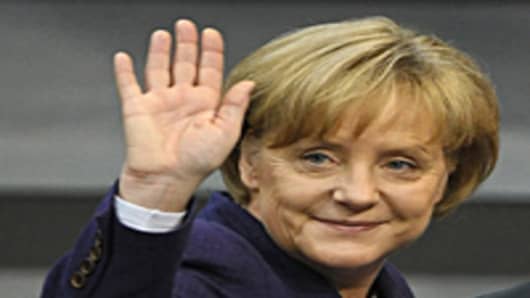German Chancellor Angela Merkel flies into the heart of Europe's debt crisis on Tuesday, facing protests by angry Greeks to bring a message of support to a near-bankrupt nation fighting to stay in the euro.
Europe's most powerful leader can expect a hostile reception by a people worn down by years of recession and austerity which many see as forced upon them by an overweening Germany as its price for emergency loans.
Police have banned protests in most of central Athens and readied 6,000 officers, including anti-terrorist units and rooftop snipers, to provide security during the six-hour visit, Merkel's first since Greece's debt crisis erupted in 2009.
It marks a gesture of support for the ruling coalition under Prime Minister Antonis Samaras, a fellow conservative, as he struggles to impose more cuts on a society fraying at the edges after five years of crippling recession.
It also underscores Merkel's commitment to keep Greece in the euro zone - at least until Germans vote in a parliamentary election due in a year.
Teachers, doctors and other public employees will stop work on Tuesday in a gesture of protest, while trade unions and opposition political parties said they would take to the streets, risking confrontation with police.
Demonstrations in Athenshave a habit of turning violent, hijacked by radicals armed with petrol bombs and concrete ripped from the streets.
Thousands of trade unionists rallied on Syntagma Square outside the Greek parliament building on the eve of the visit, waving national flags. Among banners were slogans that included: "Don't cry for us, Angela" and "Angela, you are not welcome."
"We know she doesn't care about the Greeks and what we're going through," said Maria Koumarianou, 64. "We must all protest for the future of our children and grandchildren. If the turnout is big, she'll see we're at a dead end, that we can't survive."
German Election
Greece is locked in talks with its troika of lenders - the European Union, European Central Bank and International Monetary Fund - on yet more cuts to secure the next tranche of a 130-billion-euro ($170-billion) loan package, its second bailout since 2010. Without the 31.5-billion-euro tranche, Greece says it will run out of money by the end of November.
But many Greeks say they cannot take much more of cuts to wages and pensions, the tax hikes and the recession that has left a quarter of the workforce jobless.
"We have concluded agreements with each other, and we are looking at their implementation," Merkel said on Monday. "I know that Greece is not going through an easy time at the moment," she acknowledged, while stressing its need to be competitive.
Relations between Berlin and Athens hit a low early this year; Merkel's finance minister, Wolfgang Schaeuble, likened Athens to a bottomless pit, and newspapers in Greece, which was occupied by German troops during World War Two, caricatured the pair as bullying Nazis.
But the visit suggests Merkel has judged the risks of a Greek exit from the eurotoo high for the rest of the 17-nation euro zone, especially with a German election looming next year.
Merkel is scheduled to meet Samaras, President Karolos Papoulias, and representatives of Greek business. Samaras, who won power in June, will greet Merkel at the airport.
The timing of the visit, showing Merkel very publicly with the new premier, suggests growing trust in the Greek leadership under Samaras, after a litany of broken promises and stalled reforms under the previous administration.
"Merkel's visit effectively underlines her position that Germany will continue to support Greek membership of the euro area," said Alex White, an economics analyst at JP Morgan Chase in London.
"We expect the chancellor to remain consistent on this point, at least until after Germany's federal election next September."


